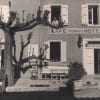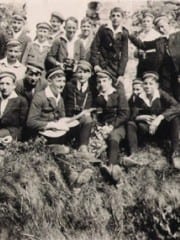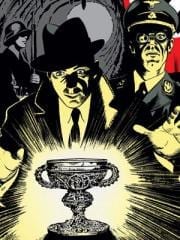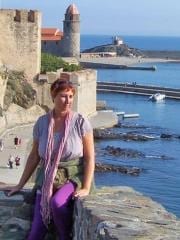Couquet
Monument to Rahn in Burg Waldeck (Hunsrück). Rahn and Wandervogel
V.: I have a question. Richard mentions the monument to Otto in the forest of the Hunsruck. Have anyone some pictures? Or the precise coordinates? I have not found any mentions about.
By the way - I don't like the inscription on it “Caution – these ways lead astray!”
It's not so simple)
Richard Stanley: Ave V. - You are right, mon frere. It is not so simple! The monument is a round stone bank in the courtyard of the seat of the Nerother Bund, a deeply conservative branch of the German youth movement known as the 'Wandervogel' whose headquarters can be found in Burg Waldeck in the forest of Hunsruck. As far as I know there are no photographs available on the web of this curious construction.
Otto Rahn y la Búsqueda Nazi por el Secreto de los Cátaros
La Berlin de entreguerras era una ciudad conocida en toda Europa por su sub-cultura bohemia y sus jovenes intelectuales. Entre los personajes que ardientemente celebraban los abundantes «ismos» que estaban fracturando las viejas certezas ideologicas, las cuales habian compactado el siglo XIX, pocos individuos eran mas coloridos que un joven de ojos verdes y cabellos oscuros llamado Otto Rahn. Su figura delgada, envuelta en un caracteristico abrigo negro y sombrero tiroles, arrojaba una larga sombra desde esos anos sombrios, una «gran silueta» alrededor de la cual se han acumulado los mitos mas extravagantes. El fue considerado igualmente como mason, rosacruz, luciferino, y un agente de la Sociedad Thule. Como lo plantea el autor Phillip Kerr, los contemporaneos de Rahn no se habrian sorprendido de ver «la Dama Escarlata y la Gran Bestia salir volando desde la puerta del frente» de su apartamento en Tiergartenstrasse. Uno de sus companeros de la Orden Negra de Heinrich Himmler comento en un memorandum interno que el «medio sospechaba que Rahn tenia relaciones con el pueblo pequeno».
В поисках утраченного Грааля
Берлин между мировыми войнами был городом, известным по всей Европе своей богемной субкультурой молодых интеллектуалов. Среди лиц, которые горячо обсуждали много модернистских "измов", которые ломали старые идеологические определения, что склеивали 19-ое столетие, немногие были более колоритными, чем этот темноволосый, зеленоглазый молодой человек по имени Отто Вильгельм Ран. Его худая фигура, одетая в характерный черный плащ и фетровую шляпу, бросает длинную тень из тех сумеречных лет, ‘великий силуэт’, вокруг которого вращались самые невероятные мифы. Он, как говорили, был Масоном, Розенкрейцером, Люциферианцем, посланцем Общества Туле, посвященным Катаром и даже руководителем некоего неизвестного международного тайного общества.
Lachrymae, Chapter IV: The Final Chapter
An Online Journal by Richard Stanley<
(Originally appeared in R. S.' MySpace<, December 9th, 2007.)
Brethren, I have invited you here to this ancient, invisible theatre with the intention of not only unmasking the killer God responsible for these crimes against 'reality', but more cogently, to provide an unambiguous solution to two or perhaps three long running esoteric enigmas!
I salute those who have stayed with the program from the top. For late joiners I include an index to conjure order out of the scrolling chaos and serve as an aid memoir for those hardy few who dare read further. I have very little keyboard time at present and less in the months to come. Until we meet again this strange saga is my gift to you.
Be warned the completed text contains 'spoilers' and may be hazardous to your belief systems.
Otto Rahn Memorial Website interview with Jeanne D'Août, the Author of White Lie
Hi, Jeanne!
I congratulate you on the release of your book White Lie. This is a great event for all who are familiar with the work, searching and life of Otto Wilhelm Rahn. When did you first hear of him?
Jeanne:
The first time I heard of Otto Rahn was probably during my research of the history of Montségur and the Cathars in connection with Grail lore. I never studied the man himself and only knew what most people know; that he researched Grail lore, visited Montségur and was working for Himmler as a relic hunter in a pre-war Germany. It wasn't until 2008 that a friend sent me "Crusade against the Grail" in English, followed by "Lucifer's Court" and Nigel Graddon's "Otto Rahn, Quest for the Holy Grail". I was thinking of writing a thriller book at that time about the 1st century, and the mysteries of the Languedoc. I had already done a lot of research for the book, but didn't get around to actually writing it, because the financial crisis had made me and my husband work 7 days a week to make a living. In 2011 I first had the chance to sit down properly and started writing in January. I would write almost 18 to 20 hours a day for several months and Otto slowly became one of the key players in the book.
Raiders of the Lost Grail
Berlin between the wars was a city known throughout Europe for its bohemian subculture of young intellectuals. Amongst the personalities who hotly debated the many modernist “isms” that were fracturing the old ideological certainties which had glued together the 19th century, few individuals were more colourful than a dark-haired, green-eyed young man named Otto Wilhelm Rahn. His gaunt figure, swathed in characteristic black coat and fedora, casts a long shadow out of those twilight years, a ‘great silhouette’ around which the most extravagant myths accrued. He was variously said to be a Mason, a Rosicrucian, a Luciferian, an agent of the Thule Gesellschaft, an initiated Cathar and even the leader of an obscure, international secret society. As author Philip Kerr puts it, Rahn’s contemporaries might not have been surprised to see “the Scarlet Woman and the Great Beast come flying out of the front door” of his apartment on Tiergartenstrasse. One of his Nazi peers in Heinrich Himmler’s Black Order remarked in an internal memo that he “half suspected Rahn of being in league with the little people”. To this day, it is widely believed that this enigmatic young man knew the whereabouts of one of the most sacred relics in all Christendom – the Most High Holy Grail. But the truth is stranger still…






Последние комментарии
13 лет 50 недель назад
13 лет 50 недель назад
13 лет 50 недель назад
13 лет 51 неделя назад
14 лет 2 недели назад
14 лет 7 недель назад